Hotline: +381 61 63 84 071
Syrian refugees: Single mothers' daily fight for survival

In Jordan, one in every four residents is a refugee, most of them Syrian. The vast majority do not live in camps, but in cities and villages, often surviving in deplorable conditions.
Among the most vulnerable are single women, many of whom have exhausted their savings as the Syrian War is set to enter its sixth year – and they are growing increasingly desperate.
These are three of their stories.
JAMILA
‘I still smile for my children’
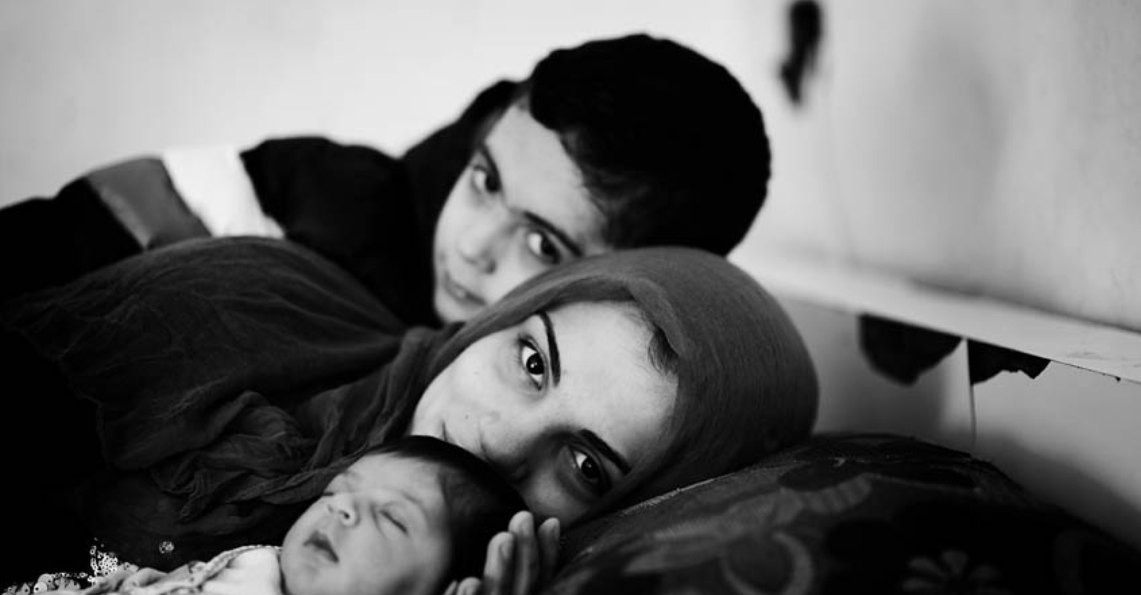
A long, steep staircase leads up one of Amman’s many hills. To reach Jamila’s shabby apartment, there are another five or six flights to climb.
In just two rooms, Jamila, 19, lives with her baby girl, her four-year-old son, her mother, and her younger sister and brother. The living room is furnished with a couple of worn sofas and an old television. In the bedroom, there is one bed and a shard of mirror on the wall.
Each month, Jamila receives a small sum from the United Nations World Food Programme to buy food - but rent has become a major problem.
“The landlord keeps raising it, and he is constantly threatening us,” she says.
Jamila has big, beautiful eyes and thick, black hair piled under a purple headscarf. She speaks openly about the difficulties of being a Syrian refugee in Jordan.
“I feel very lonely as a single mother,” she says. “The future frightens me. I don’t know how to read or write; how can I provide for my children?”
Jamila once lived in the Syrian city of Idlib. At the age of 14, she married her husband, who worked as a baker. But then the war started.
“Our house burned down. My husband couldn’t work any more; we couldn’t do anything apart from waiting to get killed,” she says. “Many nights, we went to sleep without any food or water, fearing for our lives.’’
As she was travelling on a local bus in Idlib one day, Jamila recalls watching as the bus in front of her exploded. Body parts flew through the air.
“There was blood everywhere, dead bodies on the street - children, old people,” she says. “Then we decided to flee. It was hard to leave my country, but I wanted my son to live.”
The little boy sits quietly next to his mother. The trauma of war has taken its toll on him, she says; when a plane flies overhead, he screams.
After leaving Syria, Jamila and her son settled in the Lebanese town of Arsal, where Jamila’s husband had some contacts. But fighting there forced them to flee again. Jamila and her children went to stay with her mother in Jordan while her husband left for Turkey, hoping to eventually reach Germany.
“He planned to pay a smuggler to take him to Greece in a rubber boat, but I haven’t heard from him ever since. It’s been seven months now, and he never called,” Jamila says. “On the news, I heard about boats sinking. Deep in my heart, I know that he will never come back, that he’s drowned.”
She stares out the window at Amman’s endless hills, dotted with myriad white houses. She is not crying as she contemplates her husband’s fate. He was not a good man, she says. “He beat me and treated me like his servant. I am not sad for him not coming back.”
At that moment, Jamila’s baby begins to cry, and she gently starts nursing her. The little girl was born in Amman.
“She was in such a hurry, I almost gave birth to her on the stairs,” Jamila says, laughing for the first time that day. “I want my girl to go to school. I don’t want her to be like me. I want her to be a strong and educated woman.
“I used to be strong too,” Jamila adds with a sigh. “I was a girl who liked to laugh and make fun. But not after what I have been through. It’s been a tragedy for five years; but whatever happens, I will still smile for my children. They are the only reason for me to go on.”
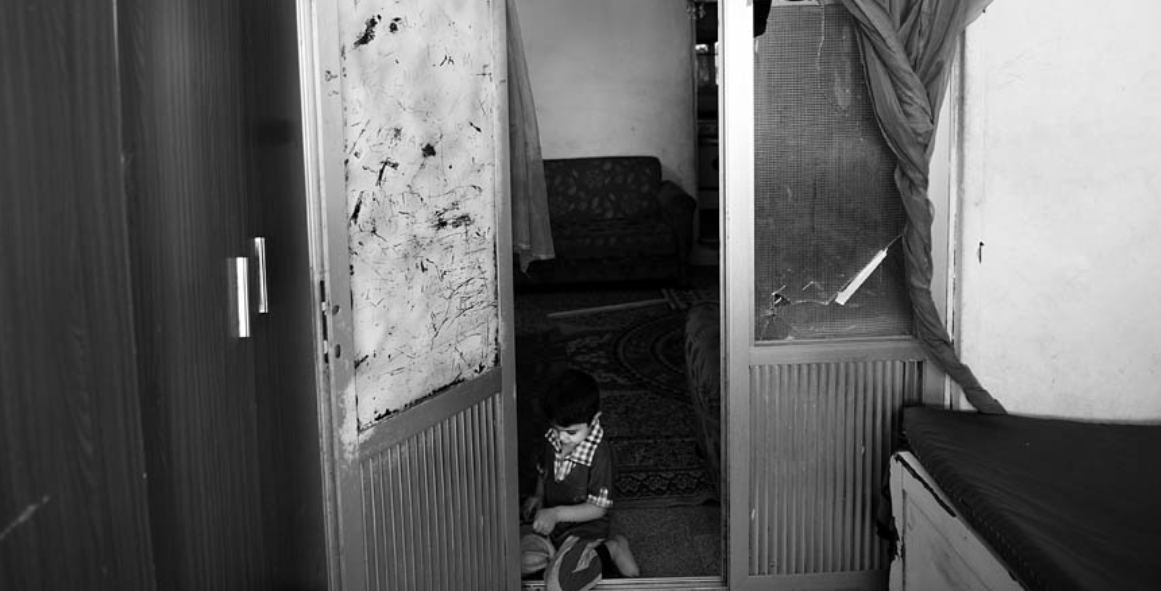
UMM MOHAMMED
‘Syria will never be like it was’
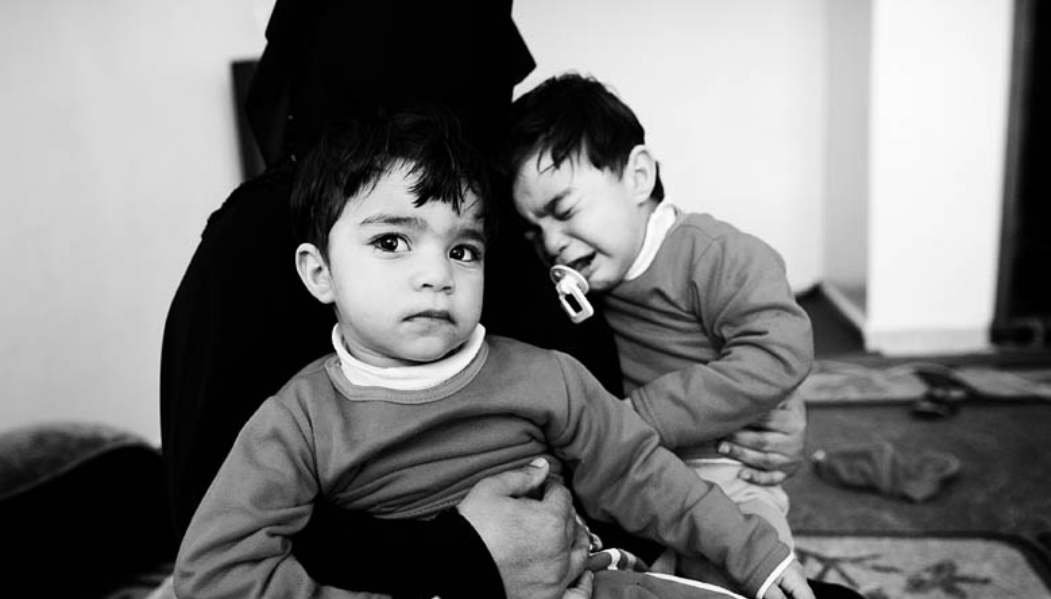
In an empty apartment on the desolate outskirts of the northern Jordanian city of Mafraq, 40-year-old Umm Mohammed lives with her six children. When she opens the door for a visitor, her youngest girls, two-year-old twins, start to cry at the top of their lungs. They are frightened; they rarely see visitors.
Umm Mohammed’s teenage daughters, their faces pale under black headscarves, try to comfort the twins as their mother speaks.
“We are from Homs,” she says. “One day, after the war started, we got a warning. We had to leave our house immediately. I thought we would just go for a few hours and then return, to continue living there. But when we came back, the neighbourhood was in ruins.’’
The family tried to return to what was left of their house in hopes of salvaging some of their belongings, but they never made it.
“There were dead bodies everywhere,” Umm Mohammed says. “All we had left were our IDs and the clothes we were wearing.”
The family fled to a nearby village, and then another, and then another.
“It was as if the war was following us,” she says. “Every time we had to move, I was so afraid for my girls because armed men would rape young women in front of their parents. I knew what happened to one of my closest friends. She was pregnant when she was raped. They ripped open her belly and cut her baby to pieces.”
The family later fled to Jordan, where Umm Mohammed’s husband began to work illegally to provide for them.
“He took on everything he could find: construction, selling vegetables. But he was caught and they sent him back to Syria,” she says. “That was in December 2014. I haven’t had any news from him since. There are rumours that he left for Europe, but we don’t know if that’s true.”
One of her teenage daughters enters the room with a tray of coffee. Asked about her father, she smiles shyly and says she is sure that one day she will see him again.
“He was a caring and loving man,” Umm Mohammed says. “We are Bedouins, and for a Bedouin wife, the house is her kingdom. The woman does the housekeeping; the man provides the bread. My husband always looked after us very well, but now I am alone. The responsibility weighs heavily on me.”
Since her husband left, she says she has started wearing a full face veil. “I have never worn it in Syria, but now I do. As a single woman, I feel I have to protect myself.”
To earn a bit of money, Umm Mohammed cleans staircases in buildings, but often, she has to beg neighbours for something to eat.
“They gave us the cushions we are now sitting on and the breakfast we had this morning. I now am a burden for other people,” she says, dabbing at her eyes.
“It’s so hard to accept. I have lost all hope. If the war ever stops, it will at least take 50 years to rebuild Syria – and it will never be like it was.”
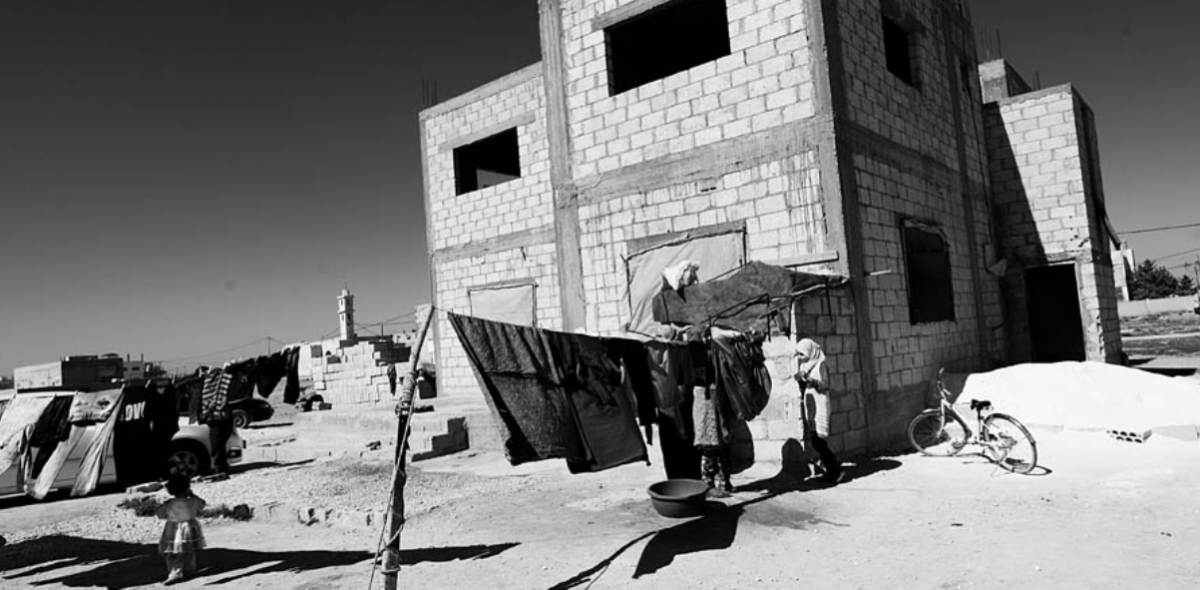
SHEMKHA
‘My heart is broken’
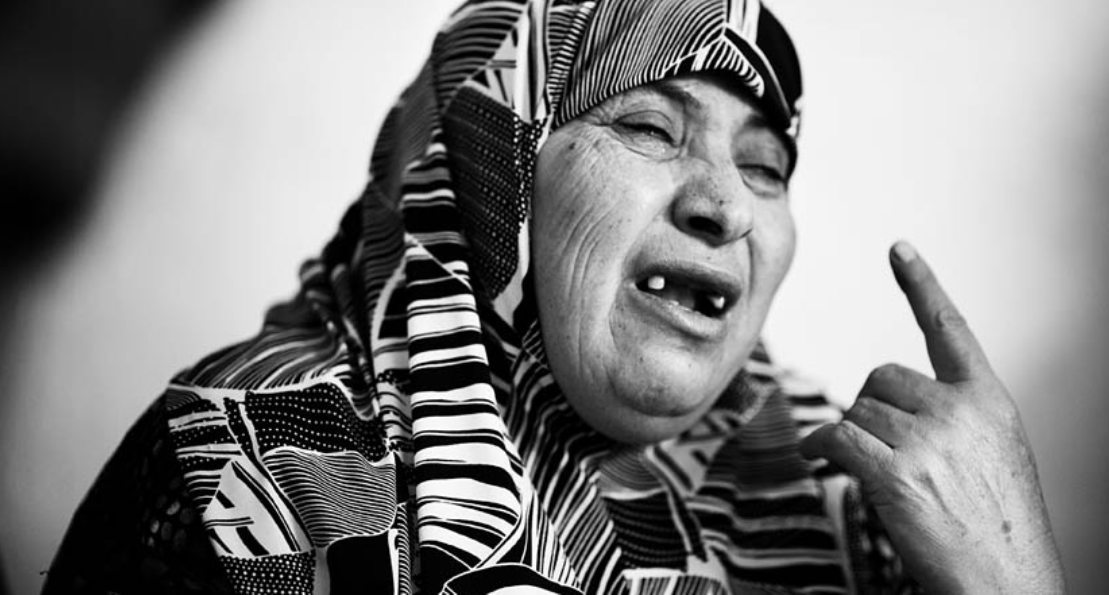
In Deraa, Syria, Shemkha had a farm where her family grew tomatoes, cucumbers and eggplants.
“We built our house there. We had everything,” Shemkha says. “But now we have nothing.”
Shemkha now lives with two of her sons, their wives and seven children in a small, dilapidated house in a village in northern Jordan.
She is 57, but her weathered face appears older under her black and white headscarf. All her front teeth are missing, smashed out by armed men “when they arrested my four sons” for no apparent reason, she says. “I ran after them.”
After two months, two of her sons returned home. The third disappeared; she has not heard from him since. The fourth died, she was told. She shows a photograph of the young man with a serious look on his face.
“My heart is broken,” she says. “I don’t know what happened to him. Did he die from torture? I know what they do to people in prison. My sons told me they were tortured. They are still psychologically affected by what they went through.”
As she speaks, her grandchildren run around the room, playing and laughing. A daughter-in-law serves coffee with a friendly smile. A neighbour comes in with her baby, just to say hello. After her sons returned from prison in 2012, Shemkha says the family decided to flee to Jordan. At first, they took shelter at the Zaatari refugee camp, but after four months, the circumstances were so bad that they opted to leave again.
“It was hell. The camp was very dirty; there was this terrible smell,” Shemkha says. “At night, it was freezing cold. There were rats and snakes; there was hardly any water. Women and men had to use the same bathrooms, and this is very dangerous for women.”
After they left Zaatari, the family spent two years moving from one house to another until landing in this sleepy village near the city of Irbid. The World Food Programme gives them $140 each month and the NGO Medair gives them some additional cash assistance – but with 12 mouths to feed and an additional $180 owing in monthly rent, it has become increasingly difficult to survive.
“We are grateful that Jordan is so generous to allow us to live here,” Shemkha says. “But our situation is very difficult. If one of us gets sick, we can’t afford to buy medication.
“I try to be as strong as I can, but it worries me so much.”
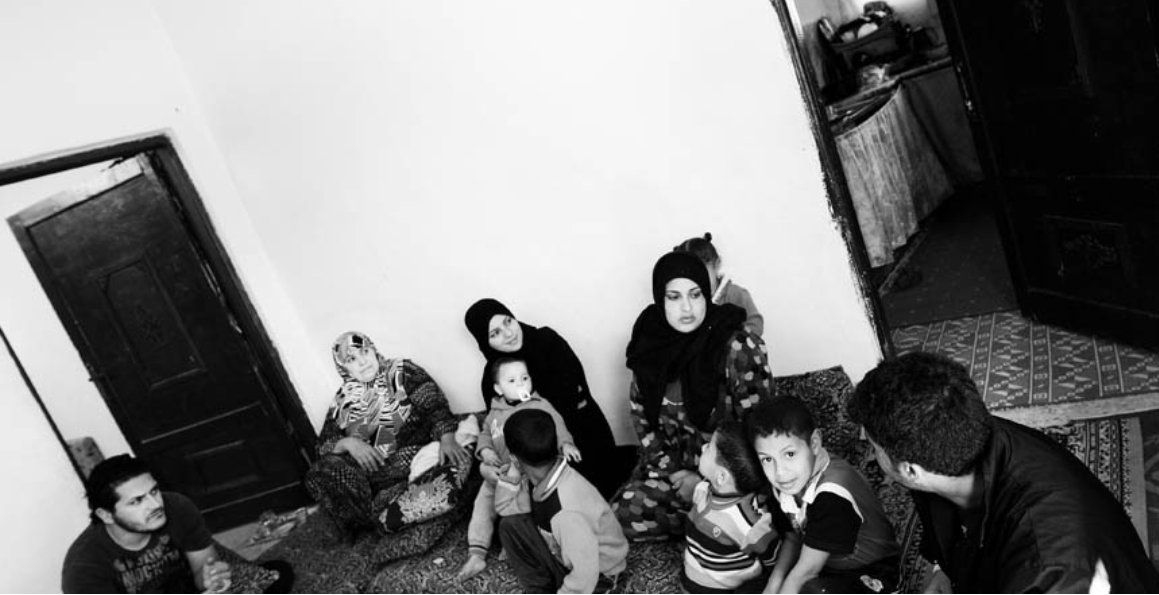
The original text can be read on the follow link:
http://interactive.aljazeera.com/aje/2016/syrian-refugees-single-women-f...












 FACEBOOK
FACEBOOK TWITTER
TWITTER YOUTUBE
YOUTUBE